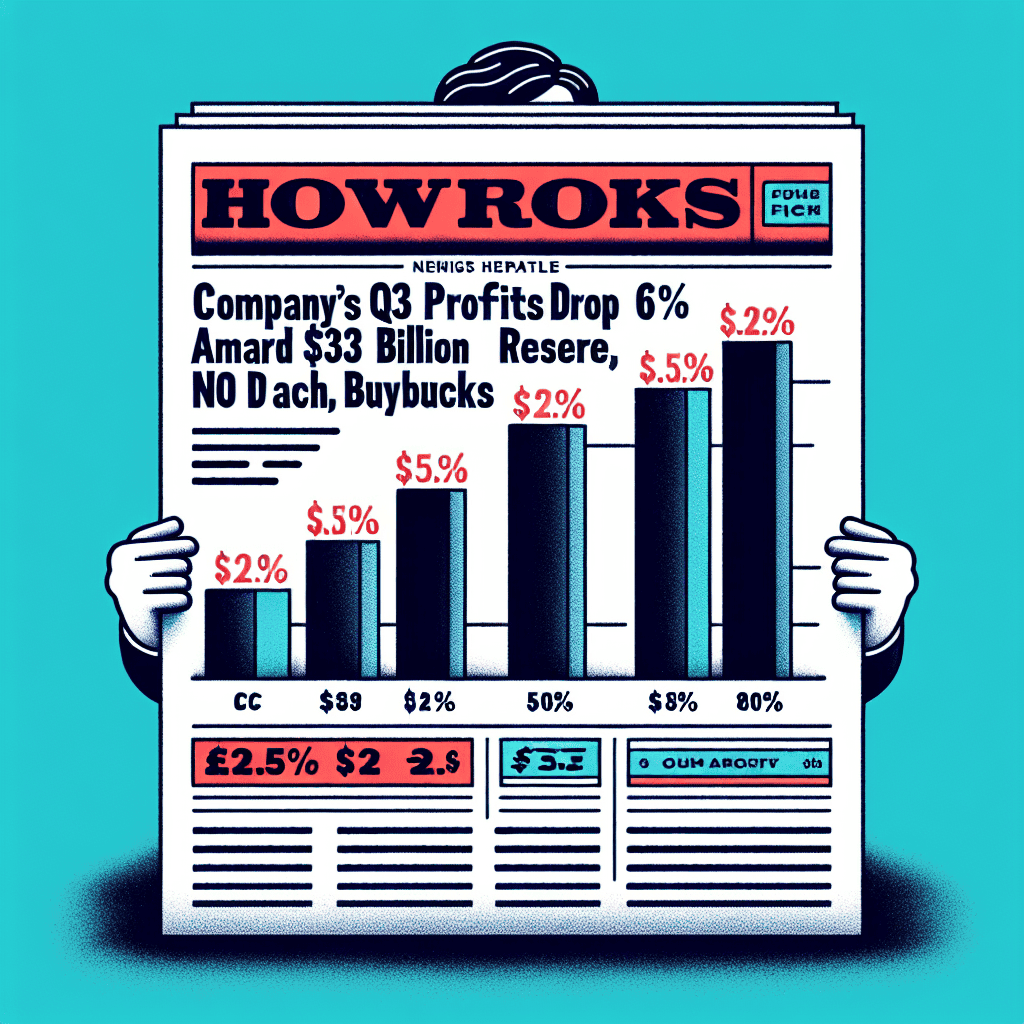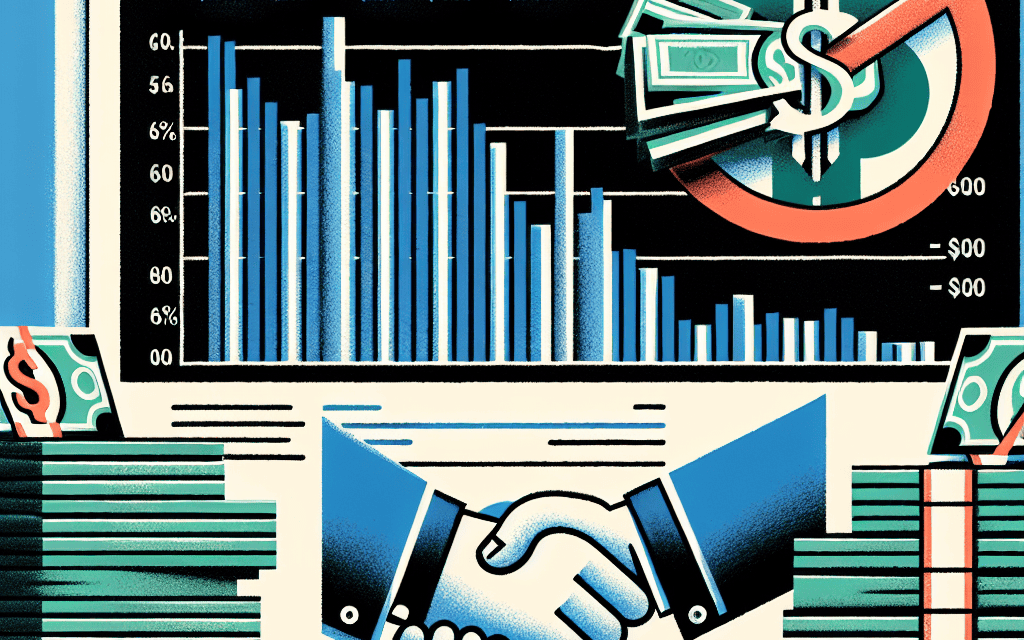“Profits Dip, Cash Piles Up: Berkshire’s Strategic Pause in a Volatile Market”
Introduction
In the third quarter, Berkshire Hathaway reported a 6% decline in profits, highlighting a challenging period for the conglomerate led by Warren Buffett. Despite the dip in earnings, the company amassed a record $325 billion in cash reserves, underscoring its cautious approach amid uncertain economic conditions. Notably, Berkshire refrained from executing any stock buybacks during this period, a strategy often employed to return value to shareholders. This financial posture reflects Buffett’s prudent management style, prioritizing liquidity and strategic flexibility over immediate returns, as the company navigates a complex market landscape.
Analysis Of Berkshire’s Q3 Profit Decline: Factors And Implications
Berkshire Hathaway’s third-quarter financial results have drawn significant attention, as the conglomerate reported a 6% decline in profits, juxtaposed with a record $325 billion cash reserve. This development has sparked discussions among investors and analysts, particularly due to the absence of stock buybacks, a strategy often employed by companies to return value to shareholders. Understanding the factors contributing to this profit decline and the implications of Berkshire’s current financial strategy requires a closer examination of the company’s operational dynamics and broader economic conditions.
To begin with, the 6% drop in profits can be attributed to several key factors. One of the primary reasons is the performance of Berkshire’s insurance businesses, which have faced increased claims and underwriting losses. Natural disasters and adverse weather events have led to higher-than-expected payouts, impacting the profitability of this segment. Additionally, the insurance industry as a whole has been grappling with rising costs and competitive pressures, which have further squeezed margins.
Moreover, Berkshire’s diverse portfolio of businesses, ranging from railroads to energy, has not been immune to the challenges posed by the current economic environment. The global supply chain disruptions and inflationary pressures have affected operational efficiencies and cost structures across various sectors. For instance, the BNSF Railway, a significant component of Berkshire’s holdings, has experienced increased fuel costs and logistical bottlenecks, which have weighed on its earnings.
In parallel, the decision to maintain a substantial cash reserve of $325 billion, without engaging in stock buybacks, has raised questions about Berkshire’s strategic priorities. Traditionally, stock buybacks are viewed as a mechanism to enhance shareholder value by reducing the number of outstanding shares, thereby increasing earnings per share. However, Berkshire’s restraint in this regard suggests a cautious approach, possibly reflecting concerns about market valuations or a lack of attractive investment opportunities.
Furthermore, the sizable cash reserve underscores Berkshire’s readiness to capitalize on potential market dislocations or investment prospects that align with its long-term value creation philosophy. Warren Buffett, Berkshire’s chairman and CEO, has historically emphasized the importance of maintaining liquidity to seize opportunities during periods of market volatility. This strategic patience, while sometimes frustrating to short-term investors, aligns with Berkshire’s reputation for prudent capital allocation.
The implications of these developments are multifaceted. On one hand, the profit decline highlights the vulnerabilities and challenges faced by even the most diversified and well-managed conglomerates in today’s complex economic landscape. On the other hand, the substantial cash reserve positions Berkshire favorably to navigate uncertainties and potentially make transformative acquisitions or investments when conditions are opportune.
In conclusion, Berkshire Hathaway’s third-quarter performance reflects a confluence of industry-specific challenges and broader economic headwinds. While the 6% profit decline may raise concerns, the company’s strategic focus on maintaining a robust cash reserve without resorting to buybacks indicates a long-term perspective that prioritizes flexibility and opportunity. As the economic environment continues to evolve, Berkshire’s approach will likely be scrutinized for its ability to balance immediate financial performance with sustainable growth and value creation.
The Significance Of Berkshire’s $325 Billion Cash Reserve
Berkshire Hathaway’s recent financial disclosures have drawn significant attention, particularly due to the company’s substantial cash reserve, which has reached a record $325 billion. This development comes amid a 6% drop in third-quarter profits, a juxtaposition that has sparked discussions about the strategic direction of Warren Buffett’s conglomerate. The accumulation of such a vast cash reserve, coupled with the absence of stock buybacks, offers a window into the company’s current priorities and its cautious approach in an uncertain economic landscape.
To understand the significance of Berkshire’s cash reserve, it is essential to consider the broader economic context. The global economy is navigating a period of volatility, characterized by fluctuating interest rates, geopolitical tensions, and unpredictable market dynamics. In such an environment, maintaining a substantial cash reserve provides Berkshire with a strategic advantage, offering both flexibility and security. This financial cushion allows the company to capitalize on potential investment opportunities that may arise during market downturns, while also safeguarding against unforeseen economic shocks.
Moreover, the decision to refrain from stock buybacks is noteworthy. Historically, Berkshire Hathaway has engaged in buybacks as a means to return value to shareholders, particularly when the company’s stock is perceived to be undervalued. However, the current restraint suggests a more conservative stance, possibly indicating that Buffett and his team do not see the present market conditions as conducive to such actions. This decision aligns with Buffett’s long-standing investment philosophy, which emphasizes patience and prudence over short-term gains.
The implications of Berkshire’s cash reserve extend beyond the company’s internal strategy. It also reflects broader trends in corporate finance, where many firms are opting to bolster their cash holdings in response to economic uncertainty. This trend underscores a shift towards risk aversion, as companies prioritize liquidity and stability over aggressive expansion or shareholder payouts. In this context, Berkshire’s approach can be seen as a bellwether for other corporations navigating similar challenges.
Furthermore, the substantial cash reserve positions Berkshire Hathaway to potentially play a pivotal role in future market developments. With such significant financial resources at its disposal, the company is well-equipped to pursue acquisitions or strategic investments that align with its long-term vision. This capability not only enhances Berkshire’s competitive edge but also reinforces its reputation as a formidable player in the global investment landscape.
In conclusion, Berkshire Hathaway’s record $325 billion cash reserve, coupled with its decision to forgo stock buybacks, highlights a strategic emphasis on financial resilience and cautious opportunism. This approach reflects a broader trend among corporations to prioritize liquidity amid economic uncertainty. As the global economy continues to evolve, Berkshire’s substantial cash holdings position it to seize opportunities and navigate challenges with agility and foresight. Consequently, the company’s financial strategy serves as a compelling case study in balancing risk management with potential growth, offering valuable insights for investors and industry observers alike.
Understanding Berkshire’s Decision Against Stock Buybacks
Berkshire Hathaway, the multinational conglomerate led by the legendary investor Warren Buffett, recently reported a 6% decline in its third-quarter profits, a development that has captured the attention of investors and analysts alike. This decline comes amid the company’s accumulation of a record $325 billion in cash reserves, a figure that has sparked considerable speculation regarding Berkshire’s strategic intentions. Notably, the company has refrained from engaging in stock buybacks during this period, a decision that warrants closer examination to understand its implications and underlying rationale.
To begin with, the decline in profits can be attributed to a variety of factors, including fluctuations in the performance of Berkshire’s diverse portfolio of businesses. The conglomerate’s holdings span a wide range of industries, from insurance and energy to railroads and consumer goods. Consequently, the financial health of these sectors can significantly impact Berkshire’s overall profitability. In the current economic climate, characterized by inflationary pressures and geopolitical uncertainties, some of these industries have faced challenges that may have contributed to the dip in earnings.
Despite the decline in profits, Berkshire’s decision to amass a substantial cash reserve is a strategic move that reflects the company’s cautious approach to capital allocation. Warren Buffett has long been known for his prudent investment philosophy, which emphasizes value investing and a long-term perspective. By maintaining a large cash reserve, Berkshire positions itself to capitalize on potential investment opportunities that may arise during periods of market volatility or economic downturns. This strategy allows the company to act swiftly and decisively when attractive assets become available at favorable prices.
The absence of stock buybacks during this quarter is another noteworthy aspect of Berkshire’s financial strategy. Stock buybacks, or share repurchases, are a common method employed by companies to return capital to shareholders. By reducing the number of outstanding shares, buybacks can enhance earnings per share and potentially boost the stock price. However, Buffett has historically been selective about buybacks, opting to repurchase shares only when he believes they are undervalued. The decision to forgo buybacks in the current quarter suggests that Buffett may not perceive Berkshire’s stock as significantly undervalued at this time, or he may be prioritizing the preservation of cash for other strategic purposes.
Furthermore, the decision against buybacks could also be influenced by the broader economic environment. With interest rates on the rise and economic uncertainties looming, maintaining liquidity provides Berkshire with a buffer against potential financial headwinds. This conservative approach ensures that the company remains resilient and adaptable, capable of weathering economic fluctuations without compromising its financial stability.
In conclusion, Berkshire Hathaway’s third-quarter performance, marked by a 6% drop in profits and a record $325 billion cash reserve, underscores the company’s strategic focus on long-term value creation and financial prudence. The decision to refrain from stock buybacks reflects a careful assessment of market conditions and the intrinsic value of Berkshire’s shares. As the conglomerate navigates an evolving economic landscape, its substantial cash reserve positions it to seize future opportunities while safeguarding its financial health. Investors and analysts will undoubtedly continue to monitor Berkshire’s strategic moves, eager to glean insights from the decisions of one of the most respected figures in the world of finance.
Market Reactions To Berkshire’s Q3 Financial Results

Berkshire Hathaway’s third-quarter financial results have sparked significant interest and discussion among market analysts and investors alike. The conglomerate, led by the legendary investor Warren Buffett, reported a 6% decline in profits for the quarter, a development that has prompted a range of reactions across the financial community. This decline in profitability is particularly noteworthy given the broader economic context, where many companies are grappling with inflationary pressures and fluctuating consumer demand. However, what has captured even more attention is Berkshire’s decision to amass a record $325 billion in cash reserves, coupled with the absence of any stock buybacks during the quarter.
The decline in profits can be attributed to several factors, including the performance of Berkshire’s diverse portfolio of businesses. While some sectors, such as insurance and energy, have shown resilience, others have faced challenges. For instance, the railroad and manufacturing segments have been impacted by supply chain disruptions and increased operational costs. These sector-specific issues have contributed to the overall dip in earnings, underscoring the complex landscape in which Berkshire operates.
Despite the profit decline, Berkshire’s substantial cash reserve has become a focal point of discussion. The $325 billion cash pile is the largest in the company’s history, reflecting a cautious approach in an uncertain economic environment. This strategic decision to hold onto cash rather than deploy it in acquisitions or stock buybacks suggests a conservative stance by Buffett and his team. It indicates a preference for maintaining liquidity and flexibility, potentially positioning the company to capitalize on future opportunities when market conditions stabilize or become more favorable.
The absence of stock buybacks during the quarter has also raised eyebrows, as buybacks have been a common strategy for Berkshire in recent years to return value to shareholders. This decision may signal a shift in the company’s capital allocation strategy, possibly influenced by high market valuations or a lack of attractive investment opportunities. By refraining from buybacks, Berkshire retains more capital to potentially invest in larger acquisitions or other strategic initiatives that could drive long-term growth.
Market reactions to these developments have been mixed. Some investors express concern over the profit decline and the lack of immediate capital deployment, questioning whether Berkshire is missing out on potential growth opportunities. Others, however, view the substantial cash reserve as a prudent move, providing a buffer against economic volatility and positioning the company to act decisively when the right opportunities arise. This divergence in perspectives highlights the complexity of interpreting Berkshire’s financial strategy in the current economic climate.
In conclusion, Berkshire Hathaway’s third-quarter financial results have generated considerable debate among market participants. The 6% drop in profits, combined with a record cash reserve and the absence of buybacks, presents a multifaceted picture of the company’s current position and future prospects. While some may view these developments with skepticism, others see them as indicative of a strategic approach that prioritizes long-term stability and flexibility. As the economic landscape continues to evolve, Berkshire’s decisions will undoubtedly be closely scrutinized, with investors keenly watching for any signs of how the conglomerate plans to navigate the challenges and opportunities that lie ahead.
Warren Buffett’s Strategy: Holding Cash Versus Investing
In the third quarter of 2023, Berkshire Hathaway reported a 6% decline in profits, a development that has sparked considerable discussion among investors and analysts alike. This decline comes amid the conglomerate’s decision to amass a record $325 billion in cash reserves, a strategy that has raised questions about Warren Buffett’s current investment approach. Traditionally known for his astute investment decisions, Buffett’s choice to hold such a substantial amount of cash rather than deploying it into new investments or share buybacks has led to speculation about his future plans and the broader economic landscape.
The decision to maintain a large cash reserve is not entirely unprecedented for Berkshire Hathaway. Historically, Buffett has emphasized the importance of liquidity, particularly during times of economic uncertainty. By holding cash, the company positions itself to capitalize on opportunities that may arise during market downturns, when asset prices are more attractive. However, the current economic environment presents a unique set of challenges and opportunities, prompting observers to question whether this strategy remains the most effective course of action.
One possible explanation for Berkshire’s cautious approach is the prevailing economic uncertainty. With inflationary pressures, geopolitical tensions, and fluctuating interest rates, the global economic landscape is fraught with unpredictability. In such a context, maintaining a robust cash reserve could be seen as a prudent measure, allowing Berkshire to navigate potential volatility with greater flexibility. Moreover, the absence of significant buybacks suggests that Buffett may be waiting for more favorable conditions before committing to large-scale investments.
Despite the rationale behind holding cash, some investors express concern over the opportunity cost associated with this strategy. With interest rates remaining relatively low, the returns on cash holdings are minimal compared to potential gains from strategic investments. Critics argue that by not deploying its cash reserves, Berkshire may be missing out on lucrative opportunities in sectors poised for growth. This perspective underscores the delicate balance between risk management and capitalizing on market opportunities, a balance that Buffett has historically navigated with remarkable success.
Furthermore, the decision not to engage in share buybacks has also drawn attention. In recent years, buybacks have been a popular method for companies to return value to shareholders, often boosting stock prices in the process. Berkshire’s restraint in this area suggests a cautious outlook on the current valuation of its shares or a strategic choice to preserve capital for future investments. This restraint aligns with Buffett’s long-standing philosophy of prioritizing long-term value creation over short-term market reactions.
In conclusion, Berkshire Hathaway’s third-quarter performance and its decision to hold a record cash reserve reflect a strategic approach shaped by current economic conditions and Buffett’s investment philosophy. While the decline in profits and absence of buybacks may raise questions, they also highlight the company’s commitment to maintaining financial flexibility in an uncertain environment. As the global economy continues to evolve, it remains to be seen how Berkshire will leverage its substantial cash reserves to seize opportunities and drive future growth. Ultimately, Buffett’s strategy underscores the importance of patience and prudence in navigating complex market dynamics, principles that have long defined his approach to investing.
Comparing Berkshire’s Performance With Industry Peers
Berkshire Hathaway’s recent financial performance has drawn significant attention, particularly in light of its third-quarter profits dropping by 6% and the company’s decision to amass a record $325 billion in cash reserves without engaging in stock buybacks. This development invites a closer examination of how Berkshire’s strategy and performance compare with its industry peers, especially in a market environment characterized by volatility and uncertainty.
To begin with, Berkshire Hathaway’s approach to capital allocation has always been a subject of interest, given its reputation for prudent financial management under the leadership of Warren Buffett. The decision to hold a substantial cash reserve, rather than deploying it through buybacks or acquisitions, suggests a cautious stance in the face of current market conditions. This strategy contrasts with the actions of many other large corporations, which have increasingly turned to stock buybacks as a means to return value to shareholders and boost earnings per share. By refraining from buybacks, Berkshire signals a preference for maintaining liquidity and flexibility, potentially positioning itself to capitalize on future opportunities that may arise from market dislocations.
In comparison, several of Berkshire’s industry peers have adopted more aggressive strategies. For instance, companies like Apple and Microsoft have continued to engage in significant buyback programs, reflecting their confidence in the long-term growth prospects of their businesses. These buybacks have been instrumental in supporting their stock prices, even as broader market indices have experienced fluctuations. However, it is important to note that while buybacks can enhance shareholder value in the short term, they also reduce the cash available for other strategic investments, which could be a consideration for Berkshire’s more conservative approach.
Moreover, the decision to hold a large cash reserve can be seen as a hedge against economic uncertainty. With concerns about inflation, interest rate hikes, and geopolitical tensions, maintaining a robust cash position provides Berkshire with the ability to navigate potential downturns more effectively than its peers who may be more leveraged or committed to returning capital to shareholders. This conservative financial posture aligns with Buffett’s long-standing investment philosophy of prioritizing safety and long-term value creation over short-term gains.
Furthermore, Berkshire’s diverse portfolio, which spans various industries including insurance, energy, and consumer goods, offers a unique perspective on its performance relative to peers. While the decline in profits may raise eyebrows, it is essential to consider the broader context of the company’s operations. For instance, the insurance sector, a significant component of Berkshire’s business, has faced challenges due to natural disasters and rising claims costs. These factors have undoubtedly impacted profitability but also underscore the importance of maintaining a strong financial foundation to absorb such shocks.
In conclusion, while Berkshire Hathaway’s third-quarter performance may appear lackluster compared to some of its more aggressive peers, its strategy of accumulating cash reserves and avoiding buybacks reflects a deliberate choice to prioritize financial stability and future flexibility. This approach, though conservative, positions Berkshire to potentially seize opportunities that may not be available to companies with less liquidity. As the economic landscape continues to evolve, the effectiveness of Berkshire’s strategy will ultimately be judged by its ability to navigate challenges and capitalize on opportunities, setting it apart from its industry counterparts.
Future Outlook: Berkshire’s Financial Strategy And Market Trends
Berkshire Hathaway’s recent financial disclosures have captured the attention of investors and analysts alike, as the conglomerate reported a 6% drop in its third-quarter profits. This decline, juxtaposed with a record $325 billion cash reserve, has sparked discussions about the company’s future financial strategy and its implications for market trends. As the investment community scrutinizes these developments, it is essential to explore the underlying factors contributing to this scenario and what it might signal for Berkshire’s trajectory.
The decrease in profits can be attributed to several factors, including fluctuations in the performance of Berkshire’s diverse portfolio of businesses. The conglomerate, led by the legendary investor Warren Buffett, has long been known for its strategic acquisitions and investments across various sectors, ranging from insurance and energy to consumer goods and transportation. However, the current economic climate, characterized by inflationary pressures and geopolitical uncertainties, has posed challenges for many of these industries. Consequently, some of Berkshire’s subsidiaries have experienced reduced earnings, contributing to the overall decline in profits.
Despite this dip in profitability, Berkshire’s substantial cash reserve of $325 billion stands as a testament to its conservative financial management. This cash hoard, the largest in the company’s history, provides a significant buffer against economic volatility and positions Berkshire to capitalize on future investment opportunities. However, the decision not to engage in stock buybacks during this period has raised questions among investors. Stock buybacks have been a favored strategy for many corporations seeking to return value to shareholders, and Berkshire itself has utilized this approach in the past. The absence of buybacks in the third quarter suggests a cautious stance, possibly indicating that Buffett and his team are waiting for more favorable market conditions or potential acquisition targets.
Looking ahead, Berkshire’s financial strategy will likely continue to emphasize prudence and long-term value creation. The company’s ability to amass such a substantial cash reserve reflects its disciplined approach to capital allocation, a hallmark of Buffett’s investment philosophy. This strategy not only provides a safety net in uncertain times but also equips Berkshire with the flexibility to act decisively when attractive opportunities arise. As market conditions evolve, Berkshire’s cash position could enable it to make strategic acquisitions or investments that align with its growth objectives.
Moreover, the broader market trends will play a crucial role in shaping Berkshire’s future outlook. The current economic environment, marked by rising interest rates and persistent inflation, presents both challenges and opportunities. On one hand, higher borrowing costs could impact consumer spending and business investment, potentially affecting the performance of some of Berkshire’s subsidiaries. On the other hand, inflationary pressures may create opportunities for companies with strong pricing power and competitive advantages, areas where Berkshire’s portfolio companies often excel.
In conclusion, while Berkshire Hathaway’s third-quarter profit decline and record cash reserve have prompted speculation about its future strategy, the company’s steadfast commitment to financial prudence and long-term value creation remains evident. As market dynamics continue to shift, Berkshire’s robust cash position and diversified portfolio will likely serve as key assets in navigating the evolving landscape. Investors and analysts will undoubtedly keep a close watch on how Berkshire leverages its financial strength to seize opportunities and address challenges in the coming months and years.
Q&A
1. **What was the percentage drop in Berkshire’s Q3 profits?**
Berkshire’s Q3 profits dropped by 6%.
2. **What is the record cash reserve amount held by Berkshire?**
Berkshire holds a record $325 billion in cash reserves.
3. **Did Berkshire engage in any stock buybacks during this period?**
No, Berkshire did not engage in any stock buybacks during this period.
4. **What is the significance of the cash reserve amount for Berkshire?**
The $325 billion cash reserve is significant as it represents a record high for the company, indicating a strong liquidity position.
5. **How might the lack of buybacks affect investor sentiment?**
The lack of buybacks might lead to mixed investor sentiment, as some investors may prefer capital returns through buybacks, while others might appreciate the financial prudence.
6. **What could be a reason for Berkshire’s decision not to engage in buybacks?**
A possible reason for not engaging in buybacks could be the company’s strategy to preserve cash for potential future investments or acquisitions.
7. **How does the profit drop compare to previous quarters?**
The 6% profit drop indicates a decline compared to previous quarters, suggesting potential challenges or changes in the company’s financial performance.
Conclusion
Berkshire Hathaway’s Q3 profits dropped by 6%, highlighting a cautious approach in a volatile economic environment. Despite holding a record $325 billion in cash reserves, the company refrained from executing stock buybacks, suggesting a strategic decision to preserve capital and maintain flexibility for future investment opportunities. This conservative stance may reflect uncertainties in market conditions or a lack of attractive investment options, underscoring Berkshire’s disciplined financial management and long-term investment philosophy.





